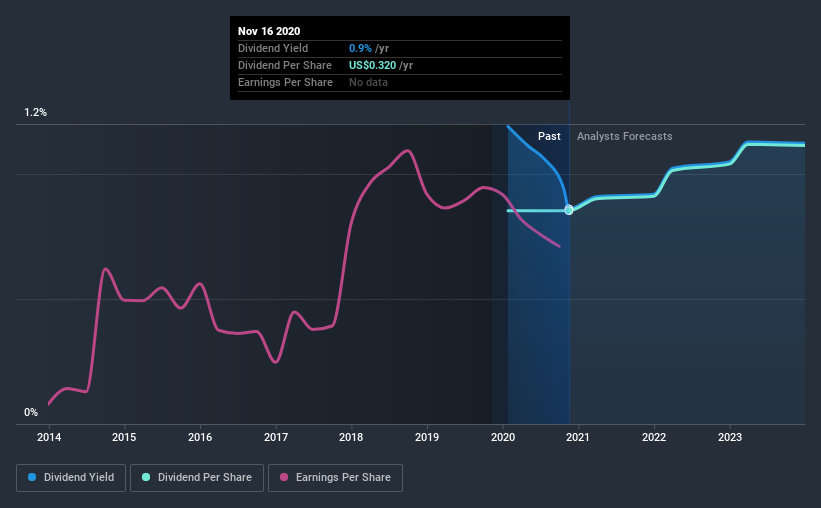Some investors rely on dividends for growing their wealth, and if you're one of those dividend sleuths, you might be intrigued to know that Rexnord Corporation (NYSE:RXN) is about to go ex-dividend in just two days. If you purchase the stock on or after the 19th of November, you won't be eligible to receive this dividend, when it is paid on the 7th of December.
Rexnord's next dividend payment will be US$0.08 per share. Last year, in total, the company distributed US$0.32 to shareholders. Based on the last year's worth of payments, Rexnord has a trailing yield of 0.9% on the current stock price of $37.18. We love seeing companies pay a dividend, but it's also important to be sure that laying the golden eggs isn't going to kill our golden goose! So we need to investigate whether Rexnord can afford its dividend, and if the dividend could grow.
Dividends are typically paid out of company income, so if a company pays out more than it earned, its dividend is usually at a higher risk of being cut. Rexnord paid out just 18% of its profit last year, which we think is conservatively low and leaves plenty of margin for unexpected circumstances. A useful secondary check can be to evaluate whether Rexnord generated enough free cash flow to afford its dividend. Luckily it paid out just 12% of its free cash flow last year.
It's positive to see that Rexnord's dividend is covered by both profits and cash flow, since this is generally a sign that the dividend is sustainable, and a lower payout ratio usually suggests a greater margin of safety before the dividend gets cut.
Click here to see the company's payout ratio, plus analyst estimates of its future dividends.

Have Earnings And Dividends Been Growing?
Companies with consistently growing earnings per share generally make the best dividend stocks, as they usually find it easier to grow dividends per share. If earnings fall far enough, the company could be forced to cut its dividend. With that in mind, we're encouraged by the steady growth at Rexnord, with earnings per share up 7.6% on average over the last five years. Earnings per share have been growing at a decent rate, and the company is retaining more than three-quarters of its earnings in the business. If profits are reinvested effectively, this could be a bullish combination for future earnings and dividends.
Given that Rexnord has only been paying a dividend for a year, there's not much of a past history to draw insight from.
The Bottom Line
Should investors buy Rexnord for the upcoming dividend? Earnings per share have been growing moderately, and Rexnord is paying out less than half its earnings and cash flow as dividends, which is an attractive combination as it suggests the company is investing in growth. We would prefer to see earnings growing faster, but the best dividend stocks over the long term typically combine significant earnings per share growth with a low payout ratio, and Rexnord is halfway there. There's a lot to like about Rexnord, and we would prioritise taking a closer look at it.
With that in mind, a critical part of thorough stock research is being aware of any risks that stock currently faces. For example - Rexnord has 3 warning signs we think you should be aware of.
If you're in the market for dividend stocks, we recommend checking our list of top dividend stocks with a greater than 2% yield and an upcoming dividend.
This article by Simply Wall St is general in nature. It does not constitute a recommendation to buy or sell any stock, and does not take account of your objectives, or your financial situation. We aim to bring you long-term focused analysis driven by fundamental data. Note that our analysis may not factor in the latest price-sensitive company announcements or qualitative material. Simply Wall St has no position in any stocks mentioned.
Have feedback on this article? Concerned about the content? Get in touch with us directly. Alternatively, email editorial-team@simplywallst.com.
The views and opinions expressed herein are the views and opinions of the author and do not necessarily reflect those of Nasdaq, Inc.


